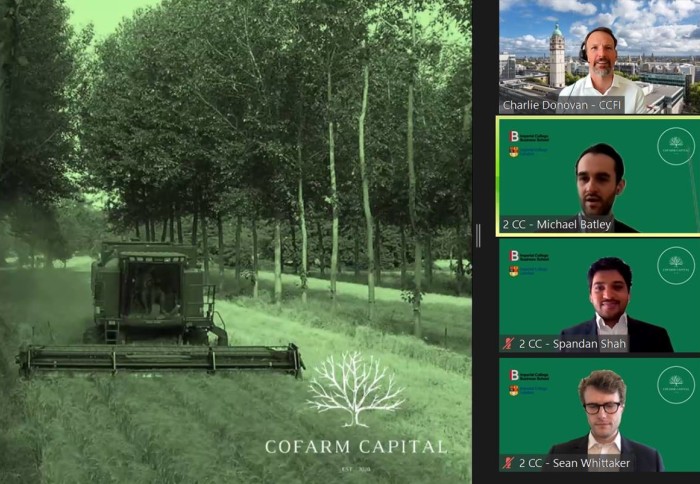Sustainable agroforestry proposal wins Climate Investment Challenge 2021
by Eva Klein

A team of Business School students have won a £10,000 prize at the second annual Climate Investment Challenge competition.
The winning team, CoFarm Capital, impressed the judges with their proposal on how to fund the development of a sustainable agricultural system in the US, tackling both deforestation and the emission of greenhouse gases.
The winning team, comprised of three Full-Time MBA students: Spandan Shah, Sean Whitaker and Michael Batley, outlined a proposal for a financial loan and operational development scheme to enable farms to replace unsustainable, intensive monocultural systems of farming with an alley cropping system. Alley cropping means trees and crops are planted in rows to preserve habitats, prevent soil degradation, and increase crop yield over longer periods of time. CoFarm won the top prize for their innovative idea and their presentation to a panel of industry experts. The students will use their prize money to develop their proposal further.
"In just its second year, the Climate Investment Challenge has become the global showcase for big ideas coming from the next generation of business leaders." Dr Charles Donovan Executive Director of the Centre for Climate Finance & Investment
Launched in late 2019, the Climate Investment Challenge (CIC) calls for postgraduate university students to develop innovative financial solutions to address climate change. The competition is a student-run initiative within the Centre for Climate Finance & Investment at Imperial College Business School.
Commenting on this year’s competition, Dr Charles Donovan, Executive Director of the Centre for Climate Finance & Investment, said: "In just its second year, the Climate Investment Challenge has become the global showcase for big ideas coming from the next generation of business leaders."
This year the CIC was a global competition, drawing 126 submissions from over 400 students around the world. In a live final hosted by Imperial College Business School, five shortlisted teams pitched their projects to a panel of three leading industry experts: David Czupryna, Head of ESG Development at Candriam, Adityadeb Mukherjee, Head of Climate Risk Management at Standard Chartered and Rory Quinlan, Co-Founder and Managing Partner at Quinbrook Infrastructure Partners.
Reacting to the news of CoFarm’s win, Spandan Shah said: "While every sector will be affected, climate change is a serious concern for agricultural producers and operators within food chains around the world. The CIC competition was a great opportunity for us to engage with this problem, creating a solution to make the sector more resilient for the future.
"We identified agroforestry as a scalable, feasible, and under-leveraged opportunity to reduce the impact of monoculture farming. We created CoFarm Capital to provide farmers with access to loans that accurately reflect the risk profile of agroforestry projects and connect farmers with the skills required to succeed with their crop diversification. To have our idea validated by some of the top names in sustainable finance is a great feeling. We are all ecstatic from the win."
All five finalist teams impressed the judges, who wanted to stress what a difficult decision naming a winner had been and encouraged all to pursue their ideas beyond the competition and to keep in touch for support and guidance over the coming year.
The team Bee Bank & Brokerage, from Oxford University, won second place, with a cash prize of £5,000. Pointing to the fact that around a third of all global food supply is reliant on pollination by bees, yet we are losing commercial hives at an astonishing rate of 40% annually, the team said incentives for beekeepers to adopt more sustainable practices have never been more important. They argued that the investment potential was both huge and necessary, for banks as well as the environment. The judges applauded Bee Bank's proposal for its truly innovative nature, agreeing on the significance of the issue for climate preservation, and encouraging the runners-up to expand their project going forwards.
The judges all commented on the importance of climate finance and of supporting student-led initiatives. David Czupryna said: "This excellent initiative brings fresh thinking, innovative ideas, and a new energy to the climate discussion, whilst showcasing our next generation of responsible investment professionals."
The CIC will continue to grow on its global success next year and to influence students who are passionate about genuine change. "I was part of this same event last year as an attendee and it was part of the reason why I decided to study at Imperial," revealed Sean Whitaker from this year's winning team, pointing to the influence the competition has had on his journey into agricultural sustainability.
Article text (excluding photos or graphics) © Imperial College London.
Photos and graphics subject to third party copyright used with permission or © Imperial College London.
Reporter
Eva Klein
Business School